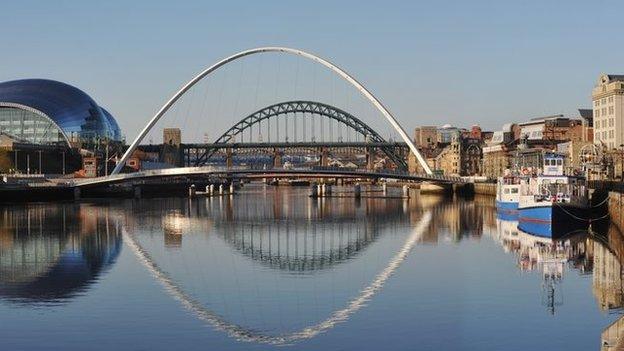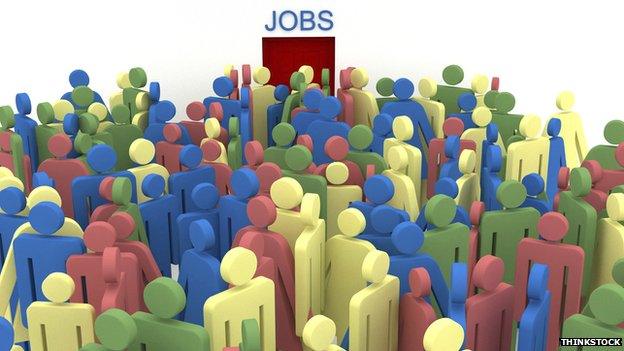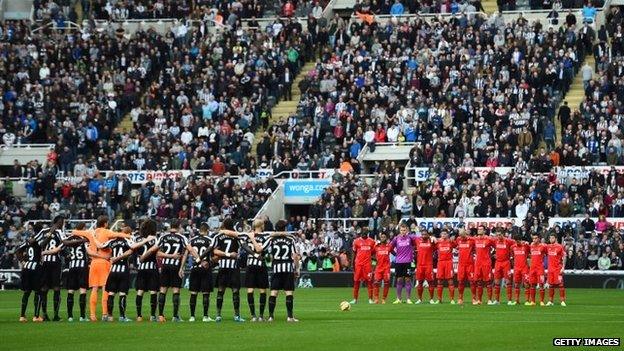Autumn Statement: The economic view from Newcastle
- Published

The North East has the highest proportion of public sector jobs in England
Of course the fine detail of what George Osborne has announced in his Autumn Statement matters - even if the lion's share of his statement was carefully handed out to the press over the previous couple of days.
Some of it was rehashed announcements of old, and some of it bold - like the plan for the government to get directly involved in house building for the first time in decades.
And yet, with an election approaching fast, it is not certain that all of Wednesday's measures will ever come to pass.
The review of business rates, for example, is not even due to report until well past the ballot.
And whatever the measures, it is now abundantly clear that the chancellor's original Plan A was not just redrafted, but more or less torn up.
Uncomfortable headlines
Instead of being down to £35bn by now, the deficit will be around £100bn.
But balancing the books, which it won't, wasn't the only task the government set itself.
David Cameron said in the run-up to the last election that "in some parts of the country, the state accounts for a bigger share of the economy than it did in the communist countries in the old Eastern Bloc.
"That is clearly unsustainable."
The parts of the country he pointed to were Northern Ireland and the north-east of England, making uncomfortable headlines in both places.
The quote might have been clumsy, but the coalition didn't just want to pay down the deficit, they wanted to change the shape of the economy.
Evan Davis hears the analysis of Newsnight's Duncan Weldon, Allegra Stratton and Chris Cook
The hope was not just that the private sector would grow in order to pick up the slack from public sector cuts, but that we'd end up with a more dynamic economy, less reliant on the state.
So here in Newcastle upon Tyne, one of the places David Cameron pointed to, what has happened?
First, some numbers. There certainly has been a change.
In 2010, there were 295,000 people working in the public sector in the North East. That's fallen now to 238,000.
Still just over 20% of jobs, and still the highest proportion of public sector jobs in England. Wales and Northern Ireland both have more, Scotland around the same.
New businesses
As with the national total - 5.7 million people working in the public sector - the numbers have fallen.
That's the lowest national number since the current system of record-keeping began in the late 1990s, but still a highly significant chunk of the 30 million or so of us who are economically active.
It seems it'd be a stretch to suggest there has been a truly radical shift from public to private.
What's clear though is the very notable national trend in the number of new businesses being started.
In Newcastle last year, 1,195 new firms launched. In 2009 that figure was just 765.
In the whole North East region in 2009, the figure was 6,625 - in 2013, 9,685 people took the plunge into business.

The jobless rate is coming down but remains high in Newcastle
Of course the economic circumstances are different now, but the trend is clear.
The number of people out of work has fallen significantly, like the rest of the UK, but, at 9.25, it remains stubbornly higher than in the rest of the country].
Should we be surprised that the region with the biggest reliance on the public sector for work is the region now where unemployment is higher than everywhere else?
But all is not doom and gloom.
Mike Jones, the boss of SMD, a company that's developing pioneering technology to help forage underwater for minerals, says business is good.
'5p until Monday'
His company is exporting around the world, but he says it has had to work hard to make that happen.
"We have to go where the money is," he says.
Right now it is not particularly in the UK, with some uncertainty around the oil and gas sector.
At the Meadow Well Connected community centre in North Tyneside, things are tough for a lot of people.
Suzanne has been looking for work for two years.
She tells me she has applied for more than 100 jobs but often gets no reply.
Money is tight. Suzanne says she has five pence in her purse to last until she receives her benefits on Monday.
But Paula, who is also at the community centre, is part of the changing pattern of employment.

It's not just the football team working hard to improve their fortunes
She was unemployed, but, as of today, she has her own business.
She got invaluable help with training and setting up on her own as a self-employed beautician.
She is obviously brimming with excitement about her future, but says it has been a "long, hard journey".
Down the road, Newcastle Council leader Nick Forbes, a critic of the coalition, describes what's happened as the "Jekyll and Hyde recovery" .
There is economic growth, but the switch from public to private sector jobs has not meant a straight "pick and drop" from one sector to the other.
Growing but lumpy
He warns that new jobs are less well paid and less secure than what came before.
And cuts to his budget leave the council's financial situation as "acute".
Of course, we all experience the economy as individuals.
People fall on hard times when the economy is healthy, others prosper when the economy is failing.
But this area has changed in the last couple of years and not entirely for the good. The economy is growing, but it is lumpy.
That "radical reshaping" the government dreamed of feels some way off.
You can see Laura's film from Newcastle, via the BBC iPlayer, here